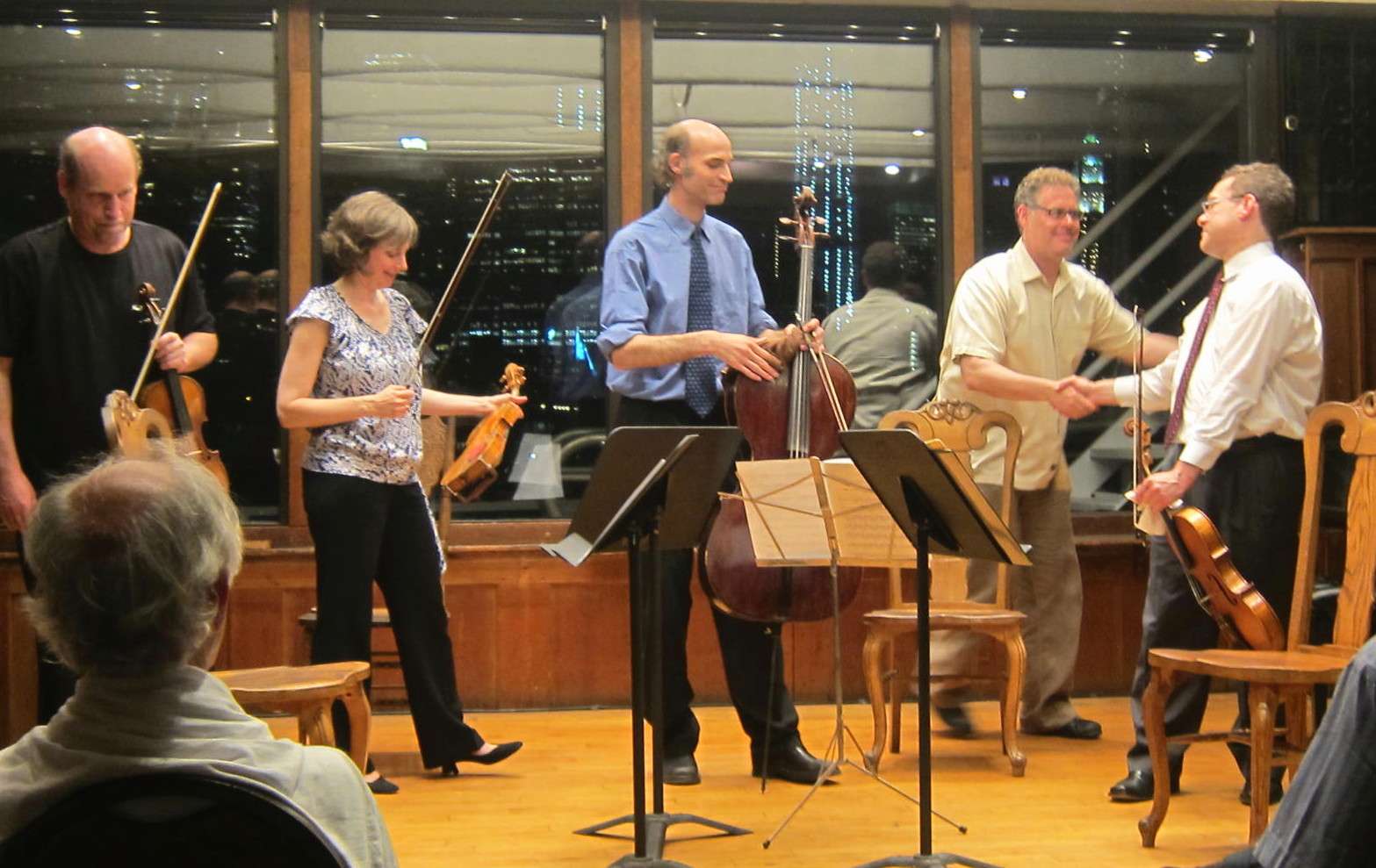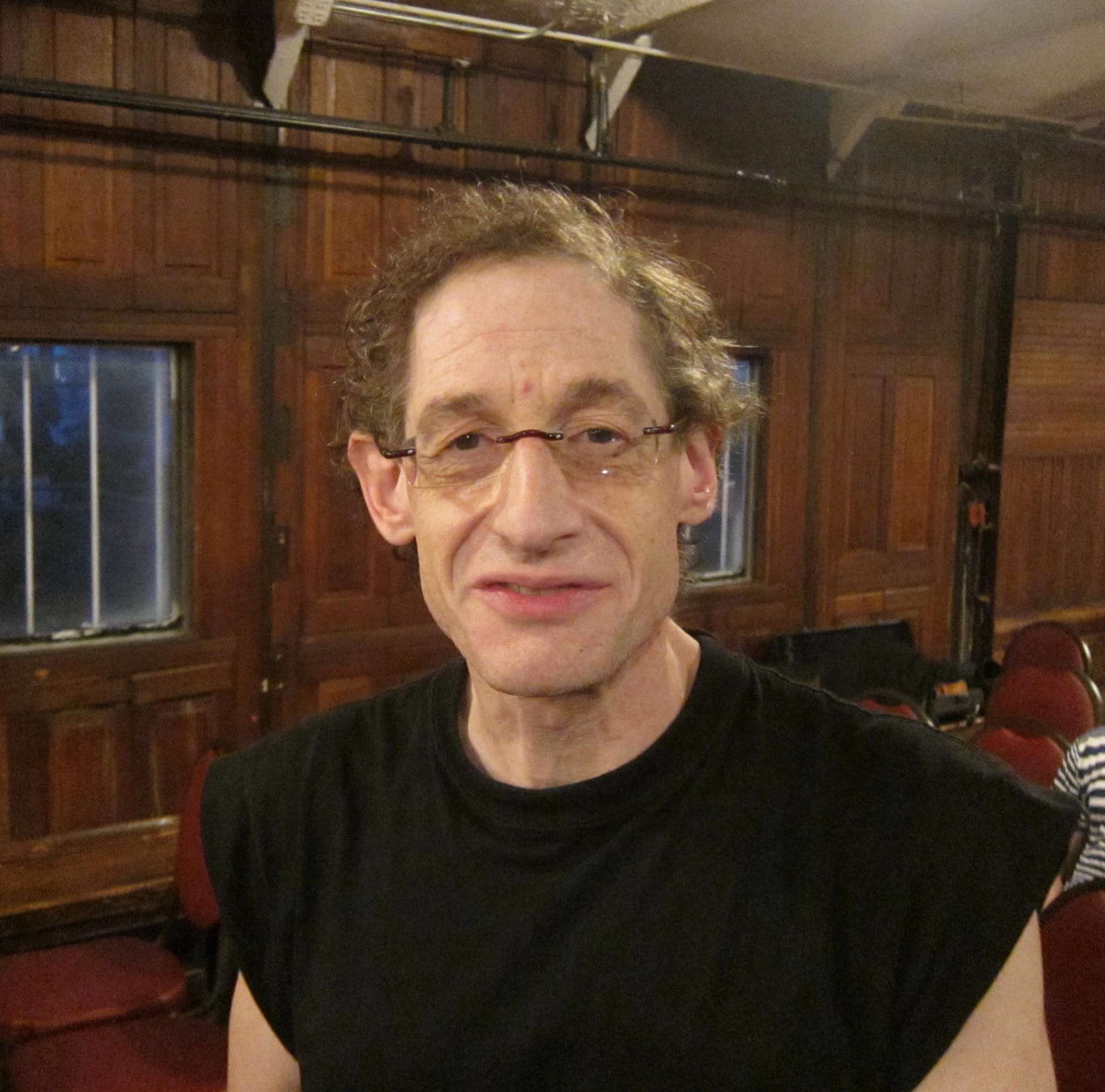|
Back
What’s In A Name? New York
BarrgeMusic, Brooklyn
05/31/2013 -
Bernard Hughes: Suck It And See (American premiere)
David Shohl: Silhouette (World Premiere)
Lois V.Vierk: Words Fail Me
Vera Ivanova: Three Studies in Uneven Meters (New York Premiere)
Harold Meltzer: Aqua
Locrian Chamber Players: Calvin Wiersma, Andrea Schultz (Violins), Daniel Panner (Viola), Greg Hesselink (Cello), Margaret Kampmeier (Piano)

C. Wiersma, A. Schultz, G. Hesselink, Composer G. Meltzer, D. Panner
(© Coco T. Dawg)
The most glorious evening for the most romantic concert hall in New York–and BargeMusic has to pull a practical joke on us poor critics.
Yes, BargeMusic is on that barge a few feet from where Walt Whitman worked, where George Washington embarked and where the East River waters and Brooklyn Bridge are the setting for New York’s still dazzling skyline.
Last evening, five of New York’s more brilliant soloists joined together for a quintet of new pieces, all written in the 21st Century, all of which had a fascination. The practical joke was that BargeMusic (or perhaps Locrian itself) makes a point of not giving out program notes, so that “you the audience can enjoy the music directly.”
Thus–prior to getting the composers’ notes after the concert–I imagined the myriad wonders of water in Harold Meltzer’s Aqua. (It was actually about a building in Chicago called “Aqua Tower”). I pictured the joy of absolute music-making for the cello-piano virtuoso piece titled Words Fail Me. (Actually, it was about the World Trade Center bombing.) And in David Shol’s Silhouette, I thought was about the almost canonic playing of violin and piano. (It was more about resonance, or perhaps a tribute to its first player.)
Thus, mea culpa the faltering of the allegedly cerebral imaginative mind.
Two of the titles did speak for themselves. Vera Ivanova’s Three Studies in Uneven Meters was for piano solo, and was played with blazing efficiency by Margaret Kampmeier. The titles here, though, were so picturesque that one couldn’t simply listen, but had to solve the three clues in the movements. To wit: I. “Bachkagel (and a bit of Stravinsky)”; II. “Canon à la Piazzolla (descending canon ostinato with all voices sustained)”; III. “Scriabinesque (fleeting cycles)”.
The other piece had joyful name–Suck It and See–and equally joyful for the expert contrapuntal composer Bernard Hughes and his very adept string quartet. At first, the different movements sounded like variations on an original phrase, but that phrase and the chords around it kept changing. The changes were done with some gleeful Haydnesque felicity. But what caught me was the second andante-tempoed movement This could have come from Dvorák’s “American” Quartet with its melody and pizzicati. Though Dvorák might have been a wee bit stoned or drunk when writing it, giving the piece all the more ebb and energy.

D. Shohl (© Coco. T. Dawg)
The most curious work was by David Shohl, whose studies include not only various instruments but the intriguing music of Sunda, the province of West Java whose gamelan music is harmonically so different from the usual Balinese music.
In fact, while Mr. Shohl expressed surprise that I had found some gamelan-type melodies in this piano-violin work (expanded from the original solo piece written for BargeMusic Artistic Director Mark Peskanov), but agreed that might have unconsciously come to the fore.
More specifically, this was about the effects of resonance–and that most essential part of Javanese music. In this case, violinist Calvin Wiersma played the first movement in front of the audience. This was a rather stately piece, with the most conservative harmonies, give or take a few dissonances. For the second section, Mr. Wiersma moved to the side of the piano, where piano and violin almost imitated themselves. Not quite canonically, but with enough variations so one was almost on edge. The music was intriguing, subtle, at times almost mystifying, its surface simplicity holding many a secret.
Mr. Peskanov had described Lois Vierk’s Words Fail Me as “murderous” for the cellist, yet Mr. Hesselink could have called it “Murder Made Easy.” Half the time he spent not plucking or playing but sliding up and down his instrument, sliding in double strings or playing one, sliding down the other.
To a degree, this was true in the first movement, where pianist Margaret Kampmeier had little to do but play a series of apparently hemidemiquaver phrases while Mr Hesselink did his “slide of hand. The second movement was far more complex. The cellist continued with his digital prestidigitation, yet the layers became more and more complex on the piano.
This was rich writing indeed, yet, sadly, I was so impressed with the performance that the underlying musical essence (and, as later discovered, the relationship to Nine-Eleven) was secondary.
More than the rest, I should have had Harold Meltzer’s explanation of the title Aqua. Later I learned that he was referring to Aqua Tower’s “soft silky lines like draped fabric”, the exterior “pulsing with a gentle rhythm.”
Instead–and inevitably–I was thinking of the manifestations of water throughout the many short and rich movements of the string quartet. I did love the inspiration of the work, the sudden dissonances contrasting with the “soft silky lines”, the repetitions of themes, the inner relationships of each instrument.
Possibly Mr. Meltzer was working on a musical metaphor of engineering. But nothing in this energetic composition even hinted at that kind of planning. It was more like a poem cycle, its musical emotions reaching out, pulling back, then returning with full and joyous impact.
CODA: My errors in judging the music were paltry compared to that Critic Emeritus of Great Britain, Donald Tovey. He once wrote a review of a Sibelius symphony, saying that in every measure one could picture the mountains, raging waterfalls and hollow gorges of Finland.
Later, he confessed, Tovey took out an atlas showing the Finland was flat and swampy!
Harry Rolnick
|